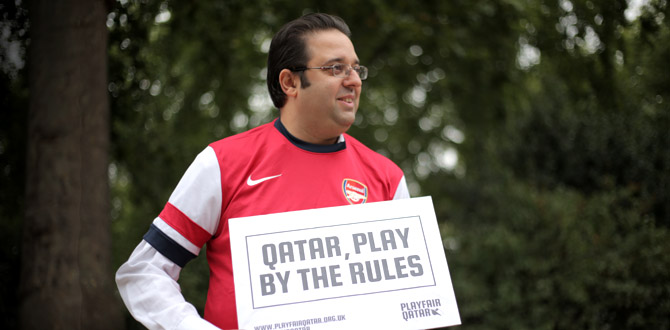Today, the UN’s workplace agency, the tripartite International Labour Organisation (ILO) voted to send a high level mission to Qatar to make an assessment of the real conditions faced by migrant workers: a major victory for the Playfair Qatar campaign. by Sam Gurney
Commenting after the vote, TUC general secretary Frances O’Grady said:
“The ILO has blown the whistle on Qatar’s time wasting. Qatar’s government policy of flatly denying the abuse of workers won’t cut it anymore: now there will be an independent investigation.
“Workers in Qatar need this investigation soon, while the pressure ahead of the 2022 World Cup is still on.
“We must continue to work together to ensure that Qatar delivers the rights its workers deserve and show it is fit to host a showcase for world football.”
On 12 June 2014 I was proud to be one of 12 worker delegates at the ILO’s international labour conference who signed a letter calling on the ILO to launch a formal commission of inquiry into the systematic non-observance of ILO conventions 29 on forced labour and 81 on labour inspection. Despite Qatar’s denials the situation for migrant workers in Qatar continues to be appalling and at each subsequent ILO governing body (GB) we called for the investigation to be launched. However, to our great frustration, we were blocked by governments including, shockingly, those like India, Pakistan and Bangladesh whose citizens are amongst those dying in their hundreds but who in the face of a massive Qatari lobbying campaign parrot the line that vast improvements have taken place.
Today we returned to the issue at the ILO governing body. In an attempt to break the deadlock, the workers group called only for a ‘high level tripartite mission’ (less emotive than a full commission) to go to Qatar to assess independently whether the government’s claims are true, with a view to considering whether a commission should be authorised at our next meeting in March. Our spokesperson, Belgian trade union leader Luc Cortebeeck, clearly set out the reasons why Qatari claims in no way matched reality as he said ‘nothing has changed and we are not fooled.’ His employer counterpart (whilst not really commenting on conditions in Qatar and giving its government some credit for ‘reforms’) did at least support the call for a high level investigatory mission.
Qatar then hit back, their minister of labour effectively claiming his country was a workers’ playground and trying to account for remaining issues by citing ‘Qatari specificities’ which needed to be preserved. A succession of governments praised the Qataris for having dealt with all the issues we had raised (on evidence ranging from thin to non-existent) and demanded the call for a commission in inquiry be dropped altogether. This roll of dishonour included; Sudan, Bahrain, India, Algeria, Venezuela, UAE, Iran, Turkey, Thailand, Pakistan, Chad, Jordan, Mauritania and Bangladesh. On the other side, the Dutch (on behalf of the EU), the US and Canadians supported our calls for a mission.
At the conclusion of the discussion the workers group took the decision to call for a formal vote. This has not happened on the ILO governing body since the early 2000s when a vote calling for a commission of inquiry on Colombia was lost. Decisions are usually taken by consensus or by a clear majority emerging following interventions; in this case it was decided that the situation was simply too serious to allow things to drag on, even without a clear majority in the discussion. The scale of the Qatari lobbying operation has been on show since the start of the GB last Monday, with teams of government officials circulating around the meeting, pulling representatives out for one-to-one chats.
At the request of a number of governments the vote was postponed till after lunch and their lobbying operation was stepped up to fever pitch. Fortunately, it was to no avail. Despite a last minute attempt by some governments, including Japan, to move the vote to Thursday (under the guise of finding a consensus, but in reality to provide more time for arm twisting) the vote was held with the call for actions – including the high-level mission – receiving the support of 35 members, with 13 against and 7 abstentions. I’m pleased to report that my UK government and employer counterparts voted enthusiastically for action on this case.
We will now see what happens next: the ILO cannot force the government of Qatar to accept the high level investigation, but if they refuse to allow it entry their claims to have resolved all the issues we highlighted in our original complaint will look even more threadbare. The wider campaign to support the rights of migrant workers in Qatar will continue to gather pace and now it will be supported by the actions called for by the ILO governing body.
And just in case anyone was in any doubt about the terrible situation in Qatar, the International Trade Union Confederation has recently launched a new website, Qatar Exposed, which draws together the stories of those affected by kafala and the appalling health and safety situation.
This blog originally appeared on Stronger Unions

